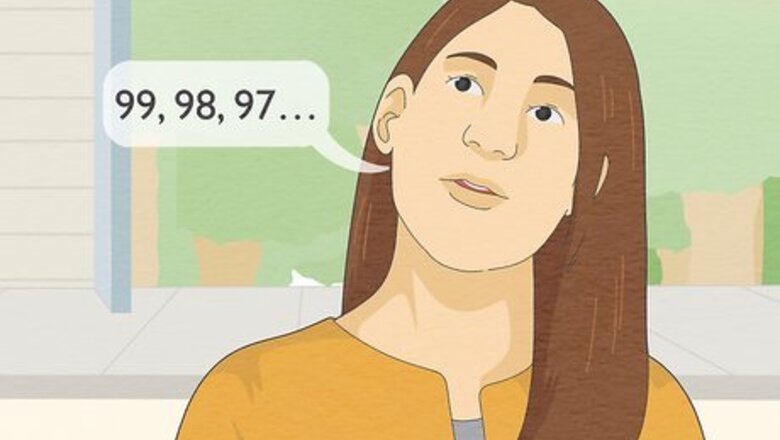
views
- Distract yourself or engage in a mindfulness exercise to keep your mind occupied until you can reach a bathroom.
- Lean back a little to take pressure off of your bladder and soothe the urge. If you have to stand, cross your legs to close your urethra.
- Flex your pelvic floor (do a Kegel exercise) if you think your bladder may not be full. This can relieve your urge to urinate.
- If you frequently experience a sudden urge to pee, contact a doctor. You may have overactive bladder syndrome.
Distract yourself.
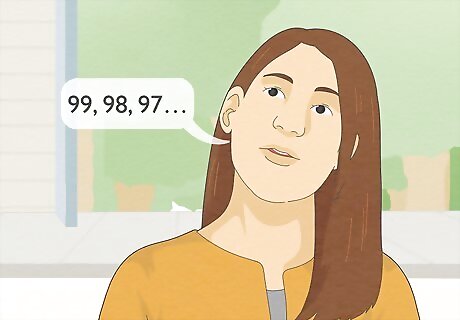
Do something unrelated to urination until you can find a bathroom. Think of whatever it takes to clear your mind of thoughts of peeing or visiting the bathroom! Simple and even silly distractions may do the trick. Try things like: Counting backwards from 99. Reciting poems and song lyrics you’ve known since you were a kid. Reciting the full names of all the people you know in the room, and making up names for those you don’t know. Giving directions to yourself on getting to your home, to the office, to the grocery store, etc.
Engage in mindfulness exercises.
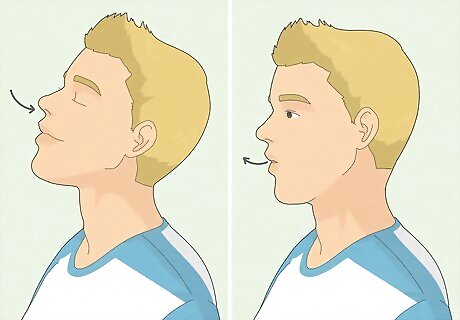
Take 5 deep breaths and remind yourself that you’re going to be ok. If you need to use the bathroom and you can’t right now, you’re probably (and understandably) anxious or panicked. But that anxiety will make the urge worse. Calm yourself down. Engage in a breathing exercises or recite positive affirmations. In a pinch, just take 5 long, deep breaths and say, “I am okay. I will get through this.” The odds are extremely low that you’ll urinate yourself if you don’t have a medical condition, but those odds go up when you start fixating on the possibility. While stretching and yoga can be great for mindfulness, they aren’t optimal here. Too much movement can make the need to pee worse.
Get away from things that remind you of water.
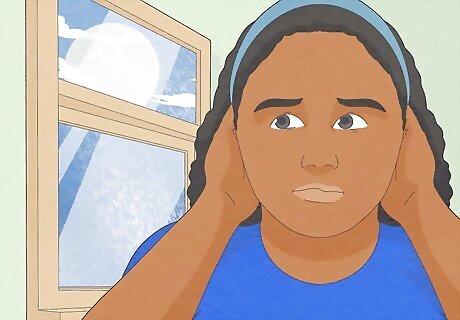
Thinking of water, waterfalls, or rain will make you want to pee more. These aren’t good distractions when you need to go! Move away from that dripping faucet or go inside if it’s raining. As talented as you may be at avoiding the power of suggestion, it’s a lot harder to avoid urinating if you’re around things that remind you of emptying your bladder. This isn’t just a TV gag. Studies have shown that the sound of running water can even trick toddlers into peeing!
Stay still.
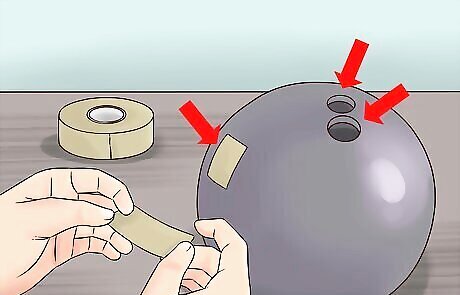
Too much movement might put pressure on your bladder. Now is not the time to go for a jog or practice your dance moves. Stop whatever activity you’re engaged in (if possible), and minimize your movement. This will minimize the odds you engage the muscles around your bladder, which may put more pressure on them and cause you to pee. Stay seated if you’re already sitting. Avoid changing positions too suddenly, or making abrupt or sudden movements. Keep your movements as fluid and graceful as possible when you walk or perform other activities.
Try to avoid laughing.
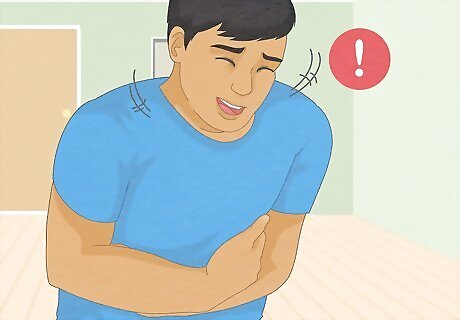
Stay away from anything humorous or silly to prevent peeing. If you happen to laugh, it can trigger the muscles around your bladder to flex, which may make you urinate. If you’re in a social setting, turn the conversation towards something political or ask someone what they think about a major issue in the news. Avoid friends and situations that may cause you to laugh. Watch a heavy drama instead of a riotous comedy on TV. If you frequently release some urine when you laugh, even when your bladder isn’t full, talk to your doctor. You may have a condition that’s sometimes referred to as giggle incontinence.
Reposition yourself to be comfier.
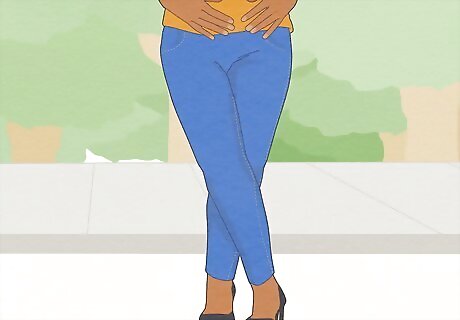
Lean back a little or cross your legs to ease the urge. You may have to do this several times while holding it in. Different positions can relieve some of the pressure on your bladder, making it easier to hold in urine. Whatever makes you feel more comfortable, stay there. Sit upright or lean back while seated. Leaning forward, especially if your pants are snug, will put more pressure on your bladder. Try crossing your legs when standing. It can help you feel like you’re closing off your urethra. Cross and uncross your legs while sitting down. These changes in position can alleviate pressure on the bladder. Raise your upper body and allow your back to arch, but do not stretch your abdomen, as this may put pressure on your bladder.
Cut back on the fluids.
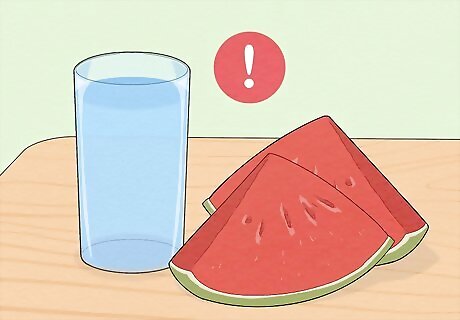
If you are currently drinking something, stop. Limit how much you drink when you need to pee. Drink enough to maintain normal hydration, but avoid anything unnecessary. Otherwise, you’ll simply be adding to your bladder overload. On top of that, being around the liquid on its own is probably not good if you want to stop thinking about needing to pee. Eating may also contribute to the problem here. A lot of food is high in water content, and if you’re already full, you may be unintentionally adding pressure to your bladder.
Pass gas if you need to.
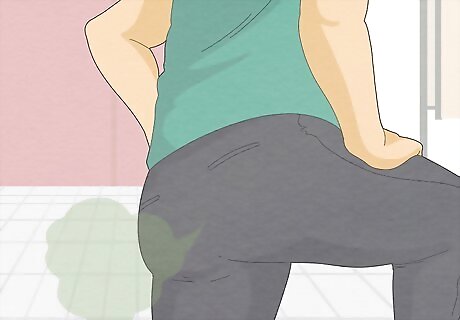
If you’re gassy, it can put pressure on the back of your bladder. The buildup of gas in your intestines can push on your bladder. Alleviating this pressure by passing gas may make you feel more comfortable, and may allow you to hold in urine longer. Excuse yourself away from whoever you’re with and try to quietly let it rip. This is why some people often feel the urge to pee after they finish a big meal. Their stomach expands and pushes on their bladder.
Flex your pelvic floor muscles.
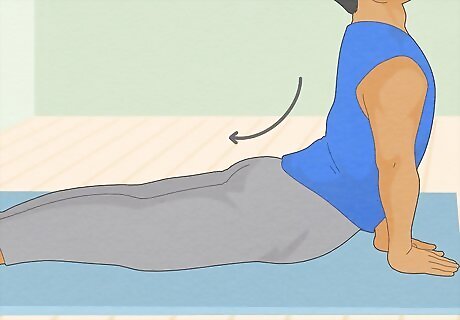
Tightening your muscles can trick your brain into thinking you already went. If your bladder may not be full, it’s possible your brain just misinterpreted a signal and thinks it’s time to go. If this is the case, “reset” the signal by flexing your pelvic muscles. Tighten your rectum and pelvic floor muscles for 3-5 seconds, then release them. Your urge may totally go away! The nerve that runs up to your brain and says “I need to pee” is located near your rectum and pelvic floor, so flexing and unflexing can often “reset” that feeling. This is unlikely to help if you actually have a full bladder, just FYI. Want to get better at flexing your pelvic floor? Start practicing Kegel exercises!
Warm your body.
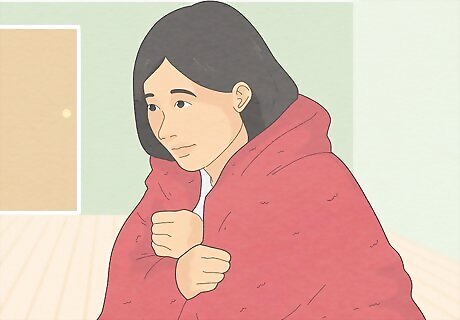
Staying warm will relax the muscles in charge of your bladder. Cover yourself in a thick blanket, turn up the heater, or cuddle up with your partner. While the exact reasoning isn’t entirely clear, many people seem to have a greater urge to urinate when they’re cold. This phenomenon is called cold diuresis. There’s also a similar condition called immersion diuresis (or cold immersion diuresis) that describes a strong urge to urinate after entering cool or cold water.
Urinate every 3-4 hours to stay healthy.
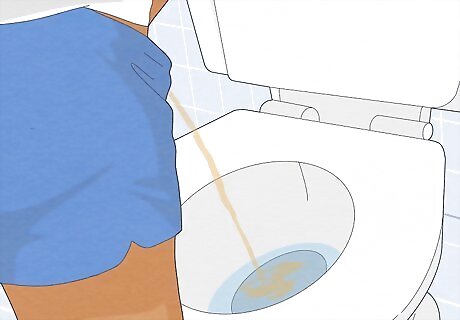
Stay comfortable by peeing regularly in the future, going forward. It’s totally fine to hold it for a few minutes if you can’t get to the bathroom right away, but it’s not good to force yourself to not pee regularly. You’ll increase the odds you get a UTI, and you may develop a bladder issue if you don’t allow yourself to pee regularly. Whenever you feel the urge to pee, find a bathroom. Most people need to urinate 4-10 times a day. That depends on how much liquid you consume and how active you are, though.
See your doctor if frequent urination continues to be an issue.
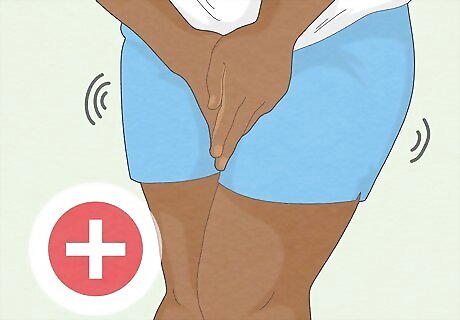
If you randomly feel the urge to pee often, you need a doctor. If you continue to need to urinate frequently despite your efforts to retrain your bladder, visit your doctor for a checkup. If you have to pee frequently and urgently, you may have an over-active bladder (OAB), which is a rather vaguely-defined medical condition that should be diagnosed by your doctor. OAB can often be treated by making healthy lifestyle changes—like improving your diet, exercising regularly, losing excess weight, and quitting smoking—and possibly by taking medication. Also speak to your doctor if you have any type of issues with incontinence—that is, releasing urine when you don’t intend to.
















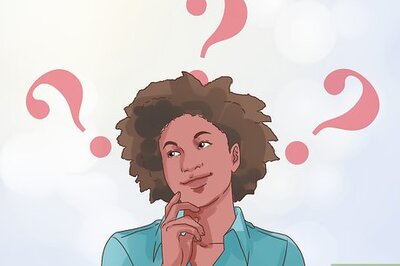


Comments
0 comment